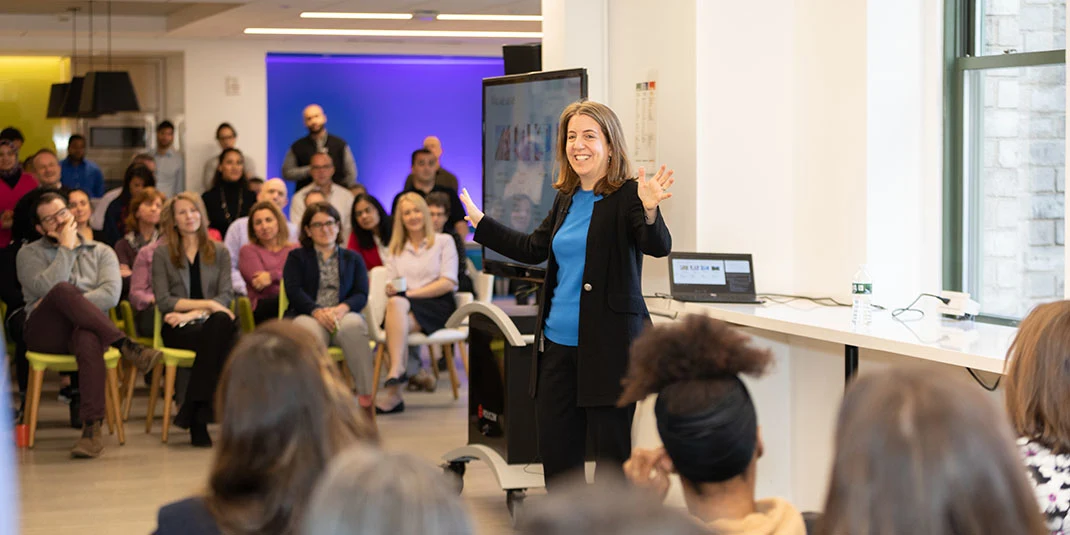Elsevier CEO Kumsal Bayazit shines as #2 Best CEO for Women
16. Juni 2023
Von Catherine Adenle, Alison Bert, DMA

2023 Comparably Awards recognize Elsevier’s CEO as a top leader for women and diversity, based on employee surveys
In a global list of 100 top CEOs for large organizations, Elsevier’s Kumsal Bayazit has emerged as a true powerhouse, clinching the coveted title of the #2 Best CEO for Women Wird in neuem Tab/Fenster geöffnet in the 2023 Comparably Awards.
Kumsal was also 9th on the list of Best CEOs for Diversity Wird in neuem Tab/Fenster geöffnet, while Elsevier’s senior leadership ranked 11th among Best Leadership Teams Wird in neuem Tab/Fenster geöffnet.

Elsevier's Kumsal Bayazit placed second on Comparably's Best CEOs for Women — large companies. See the full list here Wird in neuem Tab/Fenster geöffnet.
This distinguished ranking showcases the top-rated companies as determined by employee sentiment ratings using comprehensive data spanning nearly 20 distinct workplace categories, such as gender, ethnicity, age, experience, title, industry, location and education. The reviews for Best CEOs for Women were provided by female employees who evaluated their CEOs anonymously on Comparably’s platform over the past 12 months. For the Best CEOs for Diversity, the reviews by all employees in the system were analyzed. The final data set — a culmination of an impressive 15 million ratings spanning 70,000 companies — represents the collective voice of a diverse global workforce from companies large and small.
As the world takes note of Kumsal’s remarkable achievements, the recognition serves as a resounding testament to her solid drive to ensure that Elsevier is a great place for everyone to work. Kumsal, who has made it her personal mission to advance gender equity by establishing Elsevier’s Inclusion & Diversity Advisory Board, said:
Inclusion and diversity is at the heart of the way we work, think, and run our business, and we believe strongly in the need for recognition and visibility to support opportunities for talented women globally.

KB
Kumsal Bayazit
Geschäftsführender Direktor
These awards are special because they were voted on by our people. However, they come as no surprise, as Kumsal has consistently demonstrated exceptional leadership skills and a steadfast dedication to fostering inclusion and diversity within Elsevier. Her visionary strategies have not only driven impressive growth but have also cultivated a thriving work culture that empowers and uplifts women within Elsevier and beyond.
“I knew I was in a place where I could grow”
In her recent article for Elsevier Connect, Dr Erin Hill-Parks, Product Manager for Data Diversity in Systems at Elsevier, wrote:
In my 11 years at Elsevier, I have experienced directly how we learn to value women’s experiences and leadership and how Elsevier has embraced gender equity.
When I returned to work after maternity leave in 2019, I found that a women’s network had started in my office. The first event was a celebration featuring our new CEO — the first woman CEO in the company’s 140-year history. Listening to her, my colleagues, and other panelists speak about the importance of emotional intelligence in leadership, authenticity and the power that comes from diversity and inclusion, I knew I was in a place where I could grow while also being true to my core beliefs.
Elsevier has prioritized gender equity, dedicating resources and thought into ensuring Elsevier leads the way in inclusivity in publishing, academia and technology.
One of these resources is the Developing Talent for Gender Equity program, which identifies aspiring leaders and gives them the education and exposure they need on their journey to senior leadership.
In Erin’s case, she had spent nine years working in Book Acquisition, and she wasn’t sure if she had what it took to be a leader. Encouraged by her mentor, she applied to the program and found the confidence to lead in multiple areas. Erin took a secondment in Research Analytics. And beyond that, she gained a new perspective on her career and capabilities:
I began to explore how I could lead in a matrix career, moving across functions and departments in the company to grow my skills and experience.

Erin Hill-Parks, PhD
Driving inclusion beyond our borders

With Complete Anatomy's new full female model, created by Elsevier's 3D4Medical, users can switch between detailed female and male images with one click.
Under Kumsal’s leadership, we are not only building an inclusive workplace — we’re finding ways to drive progress in the wider world of science, technology and medicine. For example, last year, Elsevier colleagues created the world’s most advanced 3D female anatomy model, taking a major step towards tackling the unconscious bias that exists in the medical profession. And this year, they released a model with diverse skin colors and facial features to tackle racial bias in healthcare.
As the leader of our 3D4Medical product team, Irene Walsh was the one who pitched for this project to be added to the Elsevier roadmap, and then to oversee its delivery.
“Creating the 3D female model was so important to us because of the societal impact we knew it would have. It was about stepping up and being able to contribute something really positive to the world of learning anatomy. It was about being part of a company like Elsevier, whose overall goal is to drive better patient outcomes, reinforcing the feeling you’re contributing to something bigger.”

IW
Irene Walsh
Director of Product, Design & Content, 3D4Medical bei Elsevier
Beyond this, we partner with organizations around the world to provide opportunities for women in STEM and promote equity in areas such as career progression, participation in the research ecosystem and integrating the sex-and-gender dimension in research. For example, our gender reports provide data by discipline and country on how representation of women is evolving, identifying gaps and where there is real progress. They are used by policymakers and academic leaders around the globe.
In fact, the unique combination of driving equity inside and outside our company was noted when Elsevier won the 2022 Women of the Future Corporate Award. After accepting the award, Mirit Eldor, EVP for Strategy, Secretary of Elsevier’s Inclusion & Diversity Advisory Board and Executive Sponsor of Elsevier’s Gender Equity Taskforce, commented:
It was an incredibly proud moment to meet and celebrate with so many impressive women contributing to society in so many ways. The judges commented that it is unusual to see a company with such a strong focus on improving gender equity both internally and externally — this is what made us stand out.

Mirit Eldor accepts the Women of the Future Corporate Award for Elsevier. Mirit is EVP for Strategy, Secretary of Elsevier’s Inclusion & Diversity Advisory Board and Executive Sponsor of Elsevier’s Gender Equity Taskforce. (Photo by Catherine Adenle)
With an unwavering commitment to excellence, Kumsal has humbly redefined leadership. Her visionary approach and remarkable achievements have propelled our organization to unprecedented heights. Elsevier, under her inspiring leadership, continues to set new benchmarks for excellence and serves as a beacon of hope for women in our workplace and gender equality in the broader corporate and research landscape.
Mitwirkende

CA
Catherine Adenle
Senior Director, Employer Brand
Elsevier

ABD